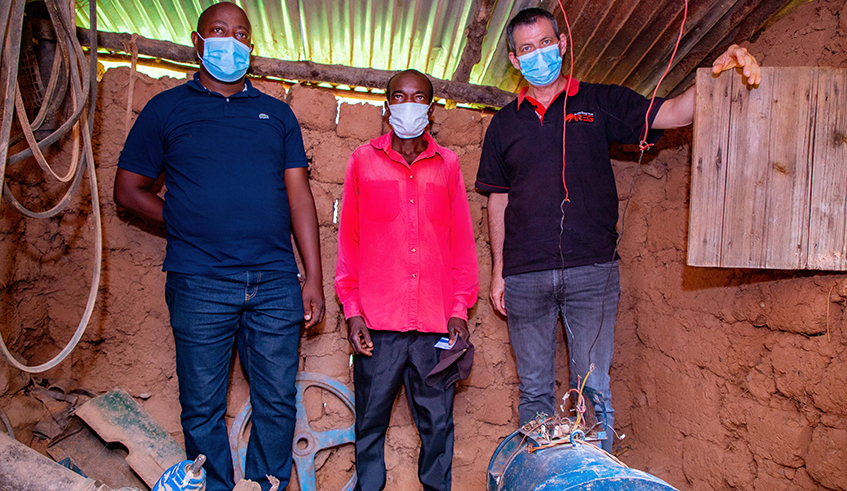

The following article was suggested by one of our readers—if there's an idea you would like us to cover, please submit it here.
Given an opportunity, Claver Bizimungu would have probably chosen the path many travel: education
The 47-year-old says during his time when growing up, it was a norm for children to follow their parent’s ways of life, which is what he did.
"If a man was a cattle keeper, most likely his children will become cattle keepers. The chances of parents taking their kids to school were minimal and so I found myself missing the opportunity of stepping in a class,” he says.
The father of two said that as a result, he became a farmer just like his parents, which he says has seen him miss out on many opportunities that came along his way.


Bizimungu’s efforts were not futile as he managed to provide electricity to his home and community as well as two nearby villages.
Bizimungu says neither he can barely read nor write. However, he says six years ago, he decided to turn things around and start an initiative that he believes was a solution to people around his area.
Changing people’s lives
After paying a visit to Ngororero District a few years back, Bizimungu said he came back with a new skill that he says was a life changer.
In Ngororero, he said, he observed how people (experts) were using the hydroelectric power plant to generate electricity for some people.
He has connected 40 homes to electricity.
In 2015, Bizimungu said after realizing the same gap in his area which is in the high plateaus of Rongi sector in Muhanga District, he decided to apply what he had observed.
"I started with my own home and after it came out successfully, I decided to extend it to others as well,” he says.
He says there was no electricity in the region and they had little hopes for getting support from the utility provider.
"Although at one point we were promised electricity connection from the utility company, I thought this would have taken time yet such services are vital to people as they help improve the quality of life,” he said.
After getting the required materials from Kigali, with minimal knowledge, he set out to create a mini waterfall on a stream in his home area.
He created what is called a hydraulic turbine which converts the energy of flowing water into mechanical energy by the use of a hydroelectric generator which converts this mechanical energy into electricity; therefore managing to make electricity from flowing water.
In general, hydroelectric power plants generate electricity using the energy from flowing water, called ‘linear kinetic energy’, and energy from pressure, called ‘pressure potential energy.
The water flow may be natural in an existing waterway, created by what is referred to as a water cycle or hydrologic cycle.
Bizimungu’s efforts were not futile as he managed to provide electricity to his home and also extended the support to other two neighboring villages; Gifurwe and Nyagasozi villages of Karambo cell.
The project is at a capacity to provide 12 Kilowatts per hour. To date, more than 40 homes connected to electricity, which according to him is a huge step in changing the livelihood of people in the community.
Before the Covid-19 pandemic, he had reached out to 60 homes.
Each family that is connected to electricity pays only Rwf 1000 per month for all the services they get from Bizimungu’s electricity initiative.
He explains that he has set a low price to ensure affordability in his local community.
Since he started the project, apart from helping the community, he has as well developed as an individual. He has managed to build a house for his family from the proceeds of the project as well as purchased a small piece of land that he anticipates using for agricultural activities.
Challenges
Bizimungu cited challenges such as lightning strikes and heavy rains, which often destroy his electric cables installation.
"My cables are not of good quality because I lack the finance to afford the ones that are durable. Most of the ones I use are not resistant to such natural calamities,” he said.
He also attributed some of the challenges to the fact that he doesn’t have any knowledge in this specific area, which to some extent limits him to do greater things.
Bizimungu however noted that at this stage, any training, and facilitation will help make bigger changes to his community as he believes this will enhance his thinking capability to help solve emerging problems as far as what he does is concerned.
His future plans he says is to be able to connect at least 300 households in the shortest time possible, if he gets the support needed to manage his major challenges.


